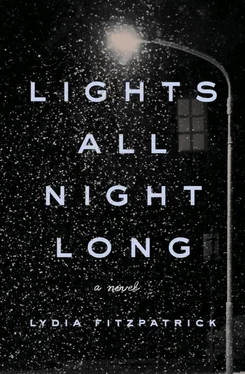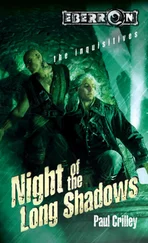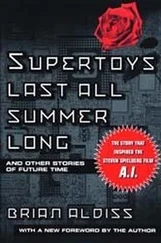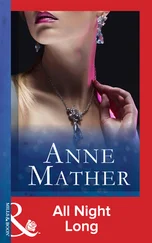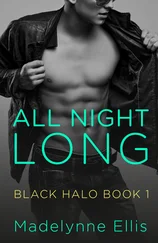Lydia Fitzpatrick - Lights All Night Long
Здесь есть возможность читать онлайн «Lydia Fitzpatrick - Lights All Night Long» весь текст электронной книги совершенно бесплатно (целиком полную версию без сокращений). В некоторых случаях можно слушать аудио, скачать через торрент в формате fb2 и присутствует краткое содержание. Город: New York, Год выпуска: 2019, ISBN: 2019, Издательство: Penguin Press, Жанр: Современная проза, на английском языке. Описание произведения, (предисловие) а так же отзывы посетителей доступны на портале библиотеки ЛибКат.
- Название:Lights All Night Long
- Автор:
- Издательство:Penguin Press
- Жанр:
- Год:2019
- Город:New York
- ISBN:978-0-52555-873-6
- Рейтинг книги:3 / 5. Голосов: 1
-
Избранное:Добавить в избранное
- Отзывы:
-
Ваша оценка:
- 60
- 1
- 2
- 3
- 4
- 5
Lights All Night Long: краткое содержание, описание и аннотация
Предлагаем к чтению аннотацию, описание, краткое содержание или предисловие (зависит от того, что написал сам автор книги «Lights All Night Long»). Если вы не нашли необходимую информацию о книге — напишите в комментариях, мы постараемся отыскать её.
Lights All Night Long — читать онлайн бесплатно полную книгу (весь текст) целиком
Ниже представлен текст книги, разбитый по страницам. Система сохранения места последней прочитанной страницы, позволяет с удобством читать онлайн бесплатно книгу «Lights All Night Long», без необходимости каждый раз заново искать на чём Вы остановились. Поставьте закладку, и сможете в любой момент перейти на страницу, на которой закончили чтение.
Интервал:
Закладка:
That winter, School #17 went electric with talk of a new drug. Rumors hummed in the halls. Krokodil the kids called it, and the cooler of them said it in English: crocodile . They said the high was like an endless orgasm, like all of your best dreams rolled into one. They said it was like living in your memories, like being back in the womb. They said you could die from one hit. That it turned your skin to scales. Some said a soldier, fresh off a stint in Chechnya, had brought the recipe to town. Some said Aksinya’s sister’s pimp had showed her how to cook it and that it was all the rage in Moscow. Others said that Sasha Blazhenov had invented it with nothing but the shit his mother kept under the kitchen sink.
Ilya learned of krokodil slowly. There was no moment when he didn’t know and then did. For some kids, the Vladimirs and Sergeys and Aksinyas of the world, life developed quickly. A Polaroid shaken. A world clarified. But without Vladimir, knowledge of the nonacademic sort came gradually to Ilya, if at all. He had to rely on overhearing and observing—conversations snipped by the open and shut of the girls’ bathroom; the grunts and nods and gestures of boys. When girls said it, their lips looped around the word. Krok-o-dil . Each syllable marked off like the tock-tick-tock of a clock. A word made for hand clapping, for dancing, for music with a beat. From boys, it came out as something sly, a long glint of a word like a knife glimpsed in a waistband.
The worst kids disappeared from school first, like they’d run through a sieve meant to separate them from what was worth keeping, and the teachers seemed more relieved than concerned. Ilya told himself it had nothing to do with him. Less than a year from now, he’d be in America. He’d pictured himself in that big-bellied plane so many times that thinking of it felt like remembering. He’d sit by a window, and as Berlozhniki grew smaller, he’d grow larger. He’d fill out his skin. Start to exist.
With Maria Mikhailovna, he practiced his idioms. Go for broke . Good riddance . Grasping at straws . He practiced ordering at an imaginary McDonald’s. Over and over he said the word “extra-large.”
“In America, you order an extra-large even if you’re not hungry,” Maria Mikhailovna said. “It’s a custom.”
“Hello, sir,” she said. “What may I prepare for you to eat today?”
“I’ll have an extra-large hamburger with an extra-large french fry, please,” Ilya said. “And please an extra-large Coca-Cola.” But that other word—krokodil—snuck in, hijacking his mind, and there was nothing he could do to stop it. He wanted, desperately, not to know or care. It was clearly the sort of thing one was better off not knowing about, but he knew that the kids disappearing were like Vladimir. If they had heard of krokodil, Vladimir had tried it. If they had tried it, Vladimir was hooked.
Aksinya and Lana were rarely at school, and then never. Aksinya left a coat of hers hanging on a hook in Maria Mikhailovna’s classroom, and every day during tutoring, Ilya stared at it. He didn’t know whether he wanted her to claim it or not. It was the same green as the larch trees, with a hood trimmed in fake fur and grime on the cuffs. It smelled of ancient cigarettes and mildew. He’d seen her in it dozens of times. He’d watched Vladimir unzip it. He’d watched her smoke in it, with the hood up and the fur edging her forehead like bangs. It was the only coat he’d ever seen her in, and they were deep in winter now—a bad winter; the snow had completely covered the crosses that ringed the camp—and Ilya couldn’t think what she was doing without it.
Once, Maria Mikhailovna caught him staring at it.
“I think it’s Aksinya’s,” she said. “She must have gotten a new one.”
Ilya nodded. Maybe she had. Maybe the same man who pimped her sister kept her and Lana now too. He might buy them new coats and perfume and high heels—all the things girls wanted but didn’t need. Those were the things Stephanie bought, in The Adventures of Michael & Stephanie , when Michael took her to the shopping mall. But Aksinya was tougher than Stephanie, tougher than her sister. She wore a T-shirt with a pig roasting on a spit, and the pig had CAPATLISM carved across its belly. Spelled like that. Spelled wrong, but Ilya hadn’t told her, nor had he thought it stupid. Plus, Aksinya loved Vladimir at least enough not to fuck other guys.
“Do you know where she is?” Maria Mikhailovna said.
Ilya shook his head. He could feel his eyes starting to burn, though he wasn’t sure why. He thought of Babushka and the way she apologized for crying sometimes, saying that it wasn’t her fault, that her eyes were just old.
“She’ll be back,” Maria Mikhailovna said. “She’s too smart to give up for good.”
Vladimir wasn’t dumb, Ilya thought, but that hadn’t stopped him from giving up on school. Or maybe that was the definition of being dumb.
“Ilya?”
She waited until Ilya looked at her to go on. “Why don’t you come to dinner at my house? Saturday night? My husband would love to meet you. And we can celebrate.”
“But I haven’t passed the boards yet.”
“I know,” she said, “but this winter we need an excuse to celebrate, right? And you will pass them.”
“OK,” Ilya said.
“Good,” she said, “that’s settled,” and she scooted a piece of paper over the expanse of desk between them. English contractions were typed in neat rows:
she’s = she is
there’s = there is
it’s = it is
hadn’t = had not
“What’s the difference between a contraction and the possessive?” she said. He watched her lips move in the spastic way they did when she spoke English. Like the words were sharp and hard to maneuver. He thought of Lana’s lips. How they paled in the cold. He imagined them opening, singing, “Krok-o-dil.”
“A contraction,” Maria Mikhailovna said, “and the possessive.”
“A contraction is a combination of two words. And a possessive shows ownership.”
“How do you form one?” She leaned back, and her glasses caught the overhead light.
“With a hook.”
“A hook?” she said, smiling. She curled a finger, slashed the air with it.
“An apostrophe.”
“Good. Now use ‘there’s’ in a sentence.”
There’s a new drug, he thought. There’s nobody left.
“There’s America,” he said. He’d have his nose against the window. He’d see it for the first time at night. The lights would be bright enough to blanken his mind, and he’d feel nothing but right.
“Again.”
“There’s nothing in the cupboard.”
“Good,” she said, “but you don’t say the ‘p’ in cupboard. It’s quiet.”
Silent , not quiet, he thought, but he nodded and wrote “cupboard” in his notebook, the last in a list of words he’d practice that night. He’d say them over and over until his voice had smoothed out all the bumps, and sometimes as his mother wiped down the table, he’d hear her murmuring them too.
Later, when Maria Mikhailovna took one of her bathroom trips, Ilya yanked Aksinya’s coat from the wall and stuffed it into his backpack. The backpack bulged, and fur sprouted from the zipper, but Maria Mikhailovna didn’t seem to notice. When they’d finished for the day, she turned out the lights and locked the classroom. They walked through the school’s empty corridors, and their footsteps sounded out a slow beat. It was strange, he thought, that she was the one person in the world that he spent the most time with. This tiny woman with the plain face and the pretty smile. They pushed through the main doors and out into the cold. It was four-thirty and pitch black. Maria Mikhailovna’s glasses fogged, and she swiped at them with her mittens, smiling apologetically.
Читать дальшеИнтервал:
Закладка:
Похожие книги на «Lights All Night Long»
Представляем Вашему вниманию похожие книги на «Lights All Night Long» списком для выбора. Мы отобрали схожую по названию и смыслу литературу в надежде предоставить читателям больше вариантов отыскать новые, интересные, ещё непрочитанные произведения.
Обсуждение, отзывы о книге «Lights All Night Long» и просто собственные мнения читателей. Оставьте ваши комментарии, напишите, что Вы думаете о произведении, его смысле или главных героях. Укажите что конкретно понравилось, а что нет, и почему Вы так считаете.
